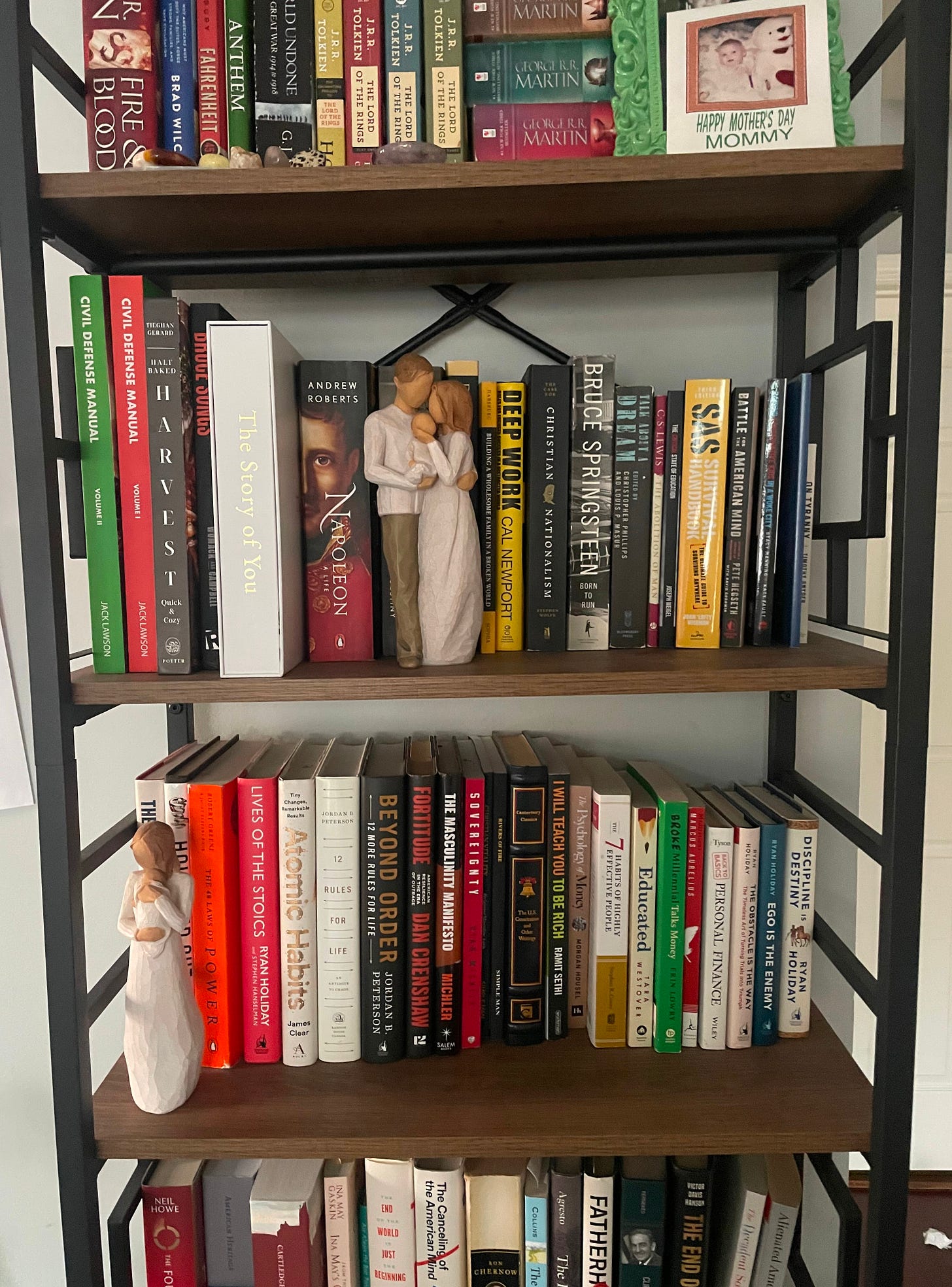Reader of this Substack know that, while I am hesitant to incorporate excessive amounts of technology in my professional teaching career, I enjoy using AI generated images (infrequently) on here. The image above represents my greatest dream - a gigantic library in my home. The reality, however is shown below:
Or then there’s this:
For my own posterity I will not include photos of the miscellaneous books strewn about my living room or on my nightstand. Nor will I include the hodge-podge “library” that fills a corner of my classroom. Years down the line I hope that these tomes will also find their place along the shelves of my literary sanctuary.
But this relates to one of the questions that my fiancé constantly asks me, often aggressively: “why do you want a home library?”
Since our first meeting, she’s raised the following points related to my obsessive collection of physical books:
“We live in the age of Kindles and PDFs and the Internet - surely you don’t need or want the physical clutter!” (And as someone who is somewhat of a minimalist I partially sympathize with this argument)
“We have a library card - you don’t need to own the books! They already have them in stock!”
“You don’t need to spend the money on these books! There are plenty of cheaper or free options!”
My fiancé is the love of my life and has improved the quality of my life in every conceivable way, but this is an area in which I often fundamentally disagree with her. So I want to take some time today and explain WHY each person should aspire to have some form of a home library in their living space. I’ll be going over four specific reasons below.
Reason #1: The Avoidance of Censorship and Restrictions
Living in the digital age gives nefarious actors and questionable, untrustworthy institutions overt and subtle power to shape and influence reality. This might take the form of AI or mass surveillance, but perhaps most concerning is the power over censoring speech and text. Recall that in 2021 the uproar over several of Dr. Seuss’ books that were seen as raciallay insensitive and offensive. Or perhaps you’ll remember the 2023 controversy over Roald Dahl’s works.
Political pressure combined with the power of Big Tech allows for restriction of ideas over Kindles and through other digital media. By physically purchasing a book (older editions specifically), you avoid the likelihood of some unseen force influencing or removing the ideas with which you are trying to engage.
Furthermore, the notion of censorship or fears over the confiscation of literature are not new. One famous 18th-century example were the accusations by Federalists in the United States that if Thomas Jefferson and the Democratic-Republicans were to ascend to political power they would openly ban the possession and distribution of Bibles.
The ability to access information and literature has been curtailed by dictators, authoritarians, and malicious powerbrokers even before the birth of the American experiment. To physically own and maintain your books is to possess a form of independence and intellectual heft against those in power.
Reason #2: The Power of Easy Access and Immersion
Professor Justin A. Jackson, an associate professor of English at Hillsdale College, makes the argument that educators should constantly engage and re-read the texts they assign their students. This is a position held not just for the benefit of supporting students working through a text, but it also serves YOU, the reader. It is not just for teachers.
When you revisit a book a second, third, fifth, tenth time, you will discover something new. New passages stick out that you might have overlooked. You might sympathize with a character or historical figure that you might have disregarded before. You will reflect differently or change your opinions on the themes and motifs that appear in the text.
The easiest example from my own education is my response to Holden Caulfield, the narrator and main character of Catcher in the Rye. I am not the first to make this claim, but high schoolers that read Salinger’s novel for the first time often find themselves relating to Holden and potentially empathizing with his philosophies and views on “phonies.” I held this view when I read it as a high school junior - it felt as though Salinger were putting my own thoughts down on the page.
However, revisiting the book at 25 gave me a new perspective. I found Holden to be self-obsessive and unnecessarily whiny. He came off as a petulant child cosplaying as an adult with delusions of grandeur rather than some misunderstood, insightful philosopher. I wonder - now at 30 and with a child of my own, will I view Holden more sympathetically? Will my paternal instincts shape this specific example in literature?
In his famous regeneration scene as he departed Doctor Who, Matt Smith’s Eleventh Doctor famously monologues that “we’re all different people all through our lives. And that’s ok. That’s good, so long as you remember all the people that you used to be.”
The text of literature might remain the same, but we do not. Easy, immediate access to literature allows you to immerse yourselves in the worlds of the authors and reflect anew each and every time you cross that paper threshold.
Reason #3: It Speaks to Your Character and Priorities
“Man cannot remake himself without suffering, for he is both the marble and the sculptor.” - Alexis Carrel
"We shape our buildings. Thereafter they shape us.” - Winston Churchill
Human beings are shaped by their environments and, in the spirit reciprocity, actively shape their environments in turn. What we consume, who we spend time with, what we focus our sustained attention on…these are things that will help form our identity.
Consequently, the literature we consume enlightens us and sustains us, guiding us in ways we might not explicitly understand. My consumption of presidential biographies has given me insights into the “soft skills” needed to endure and thrive in life. Someone who reads religious texts of their own faith tradition is participating in millennias-old rituals and practices. Books on productivity and focus can impart practical wisdom as well for daily operations. The tomes that line the walls of your home tell others who you are and what you prioritize, so read deeply and widely!
Reason #4: It Tells Your Life Story
This could be seen as reason #3(b), but there is something unique about how one’s reading habits and favorite works of literature show the rich tapestry of their life. Some of my books have become more worn than others - Chernow’s Hamilton is perhaps my most regularly-revisited biography. As a child that, while not truly impoverished, had a family with financial struggles, I felt a kinship with Hamilton. As the Founding Father who, as Lin-Manuel Miranda declared, “picked up a pen, and wrote…his own deliverance,” I empathized with the chip on the man’s shoulder.
I poured over Odysseus and Achilles and Aenas as mythological figures to teach me cunning and strength and diplomacy. Hilbilly Elegy made me rethink my social and political views. And while I cannot say I adore Lord of the Rings as many other Substack writers, how could I not sympathize with doomed Boromir or loyal Samwise Gamgee?
We may change all through our lives and birth new identities, but the books we carry with us tell us who we were and what mattered to us. The past is never truly lost to us, and the ghosts that we carry linger within the books’ whose wonders remain years later.
Reason #5: Modeling for Children
My son is nowhere ready to read the books that currently line my shelves. Even the most accessible book, The Hobbit, is far beyond his current or immediate capabilities. (Althought that hasn’t stopped me from reading Aesop’s Fables to him.) Yet nevertheless he has his own bookcase he chooses from every night for me to read to him. He is not even two yet, but I shed a tear whenever I poke my head in his room and see him flipping through his boardbooks.
A love of learning and reading should be inculcated from an early age, and by having books along the walls and in your hands regularly your children, like the sponges and imitators that they are, will mirror and mimic your habits. Which is the better habit: mindlessly scrolling while they seek your attention, or the devotion of reading history’s greatest stories to them while you pantomime and act out characters?
You can draw yourself closer to your children and pass on the wisdom of prior generations. Reading to them, engaging in the text with them, is one of the noblest and most important things you can do.
Conclusion
Perhaps I am too wistful as I type this, longing for an age of mahogany desks and history’s greatest tomes lining the walls while I sip a cup of tea in my study. I long for something I have never experienced, something I have only ever read about or seen in film. And yet I have hopes that this dream, this aspiration, can be manifested into reality. The written word is important, indescribably so.
Get a home library - you won’t regret it.
Until next time, folks.








Great article. I love my personal library for the conversations it starts and the memories I have around many of my books. I'm guilty of buying more books than I reread, but some of them have been read many times (including Lord of thr Rings😄).